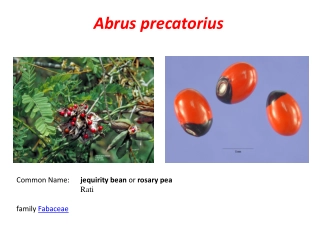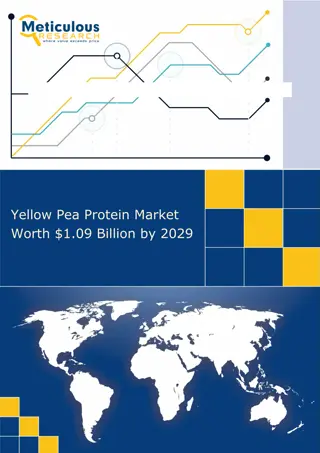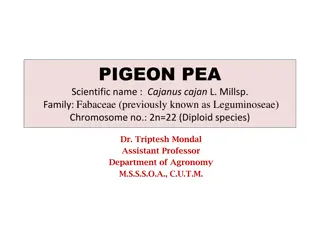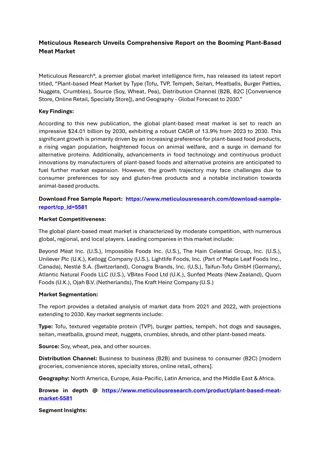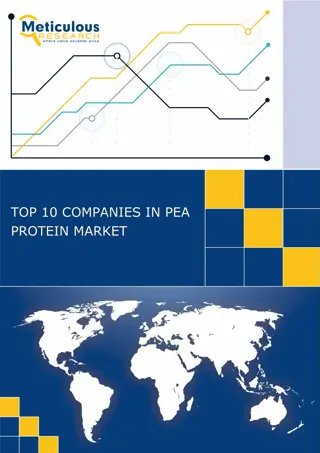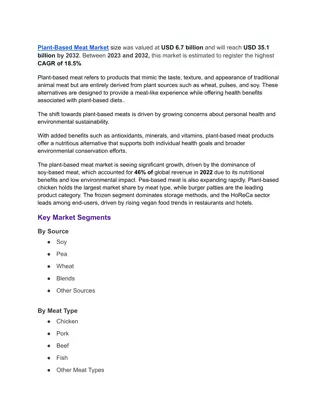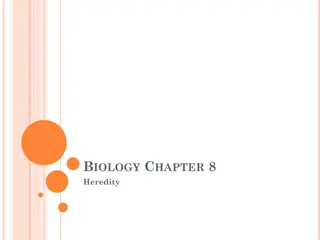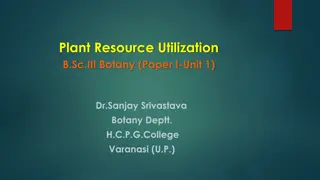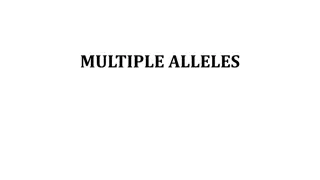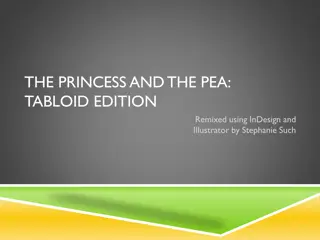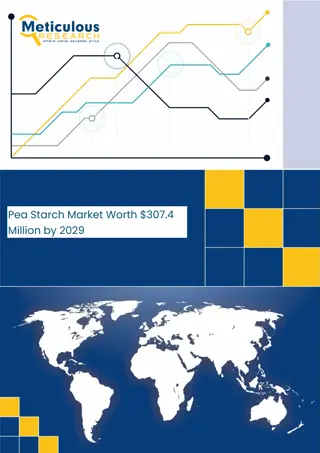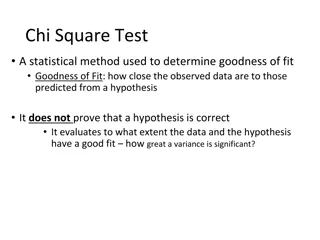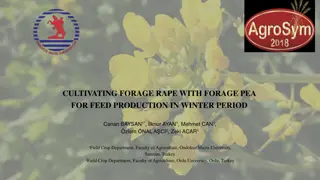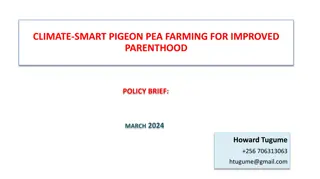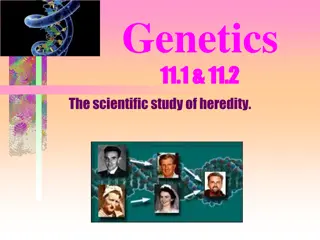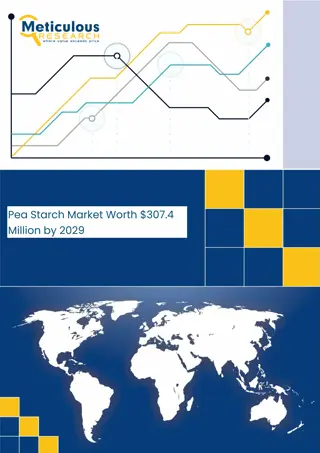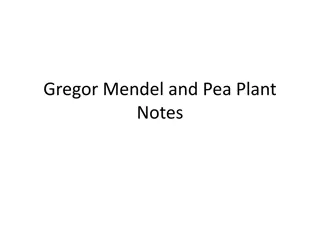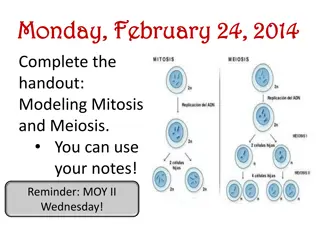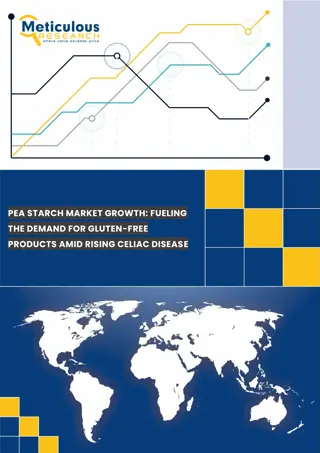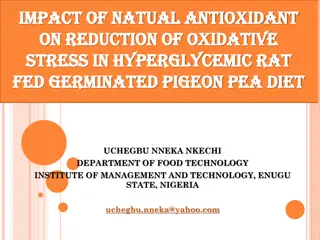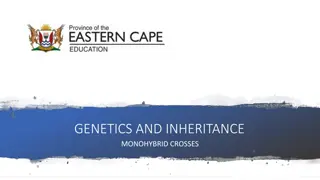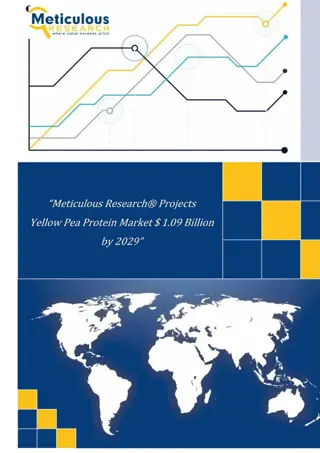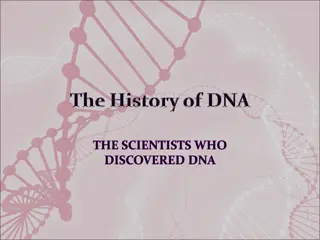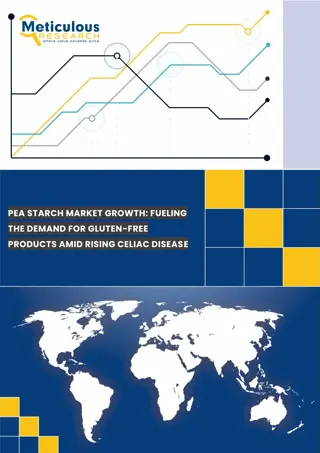Abrus precatorius
Abrus Precatorius, also known as the jequirity bean or rosary pea, is a highly toxic plant that is found throughout the tropics. Its seeds are used in jewelry and necklaces, but they can be fatal if ingested. This article explores the distribution, toxic principle, animals affected, mechanism of tox
18 views • 23 slides
Anticipated Growth: Yellow Pea Protein Market to Reach $1.09 Billion by 2029
According to this latest publication from Meticulous Research\u00ae, the yellow pea protein market is expected to reach $1.09 billion by 2029, at a CAGR of 15.8% from 2022 to 2029.\n
1 views • 4 slides
Pigeon Pea (Cajanus cajan L. Millsp) - Overview, Importance, and Uses
Pigeon pea, scientifically known as Cajanus cajan L. Millsp, is a significant kharif pulse in India. It is rich in protein, carbohydrates, fiber, and essential minerals. The plant provides nutritious grains, cattle feed, and fuel. Pigeon pea withstands soil moisture deficits, making it vital in dryl
0 views • 23 slides
Meticulous Research Unveils Comprehensive Report on the Booming Plant-Based Meat Market
Plant-based Meat Market by Type (Tofu, TVP, Tempeh, Seitan, Meatballs, Burger Patties, Nuggets, Crumbles), Source (Soy, Wheat, Pea), Distribution Channel (B2B, B2C [Convenience Store, Online Retail, Specialty Store]), and Geography - Global Forecast to 2030\n
0 views • 2 slides
PEA PROTEIN MARKET
The Pea Protein Market is projected to reach $1.14 billion by 2029, growing at a compound annual growth rate (CAGR) of 15.7% from 2022 to 2029. In terms of volume, the global pea protein market is expected to expand at a CAGR of 12.7% during the same period, reaching 4.68 million tons by 2029.
2 views • 4 slides
Plant-Based Meat Market Strengthens with Rising Flexitarian Diets
Plant-Based Meat Market by Source (Soy, Pea, Wheat, Blends, And Other Sources), By Meat Type (Chicken, Pork, Beef, Fish, and Other Meat Types), By Product Type (Burgers, Patties, Sausages, Other Product Types), By End-User, By Region and Companies -
2 views • 4 slides
Understanding Mendel's Experiments and Principles of Genetics
Delve into the pioneering work of Gregor Mendel, the father of genetics, as he conducted groundbreaking experiments with pea plants, identified key principles of genetics, and introduced the concept of dominant and recessive traits. Explore how Mendel's work laid the foundation for our understanding
4 views • 23 slides
Production and Uses of Wheat, Rice, Legumes, and Sugarcane
Cereals like wheat and rice, along with legumes such as pigeon pea and gram, play vital roles in food production and consumption. Wheat, known for its versatility in various forms like flour, bread, and beer, is a significant crop globally. Rice, a staple in many parts of the world, requires process
0 views • 12 slides
Exploring the Legacy of Gregor Mendel: Pioneer of Genetics
Gregor Mendel, an Austrian monk, revolutionized the understanding of heredity with his formulation of fundamental laws in the 1860s. Contrary to the prevailing blending theory of inheritance, Mendel's particulate theory explained species diversity and variation effectively. By meticulously conductin
2 views • 20 slides
Cross-Border Privacy Rules System in Mexico: Regulations and Enforcement
The Mexican Cross-Border Privacy Rules (CBPR) system is overseen by the Privacy Enforcement Authority (PEA) and involves binding self-regulation parameters, certification schemes, and the involvement of both the public and private sectors. The system aims to protect personal data held by private par
0 views • 7 slides
Understanding Multiple Alleles in Genetics
Explore the concept of multiple alleles in genetics through examples like pea color inheritance and human blood types. Learn how multiple alleles create various phenotypes and genotypes, illustrating concepts of dominance, recessiveness, and co-dominance in genetic inheritance.
0 views • 15 slides
Remixed Tale: The Princess and the Pea Tabloid Edition
Delve into "The Princess and the Pea" reimagined in a tabloid edition, created using InDesign and Illustrator by Stephanie Such. Explore the story, design choices, modal communication methods, challenges faced, successes achieved, and reflections on what could have been done differently. With a focu
0 views • 10 slides
Understanding Narrative Stories and Plot Structure
A narrative text is a story composed of various elements such as characters, setting, conflict, events, climax, and resolution. The structure of a narrative story can be dissected into parts like beginning, middle, and end, each serving a specific purpose in storytelling. By plotting the story on a
0 views • 13 slides
Pea Protein Market
According to a recent Meticulous Research\u00ae report, the global pea protein market is projected to grow at a CAGR of 15.7% from 2022 to 2029, reaching $1.14 billion by 2029, and expanding at a volume CAGR of 12.7% to 4.68 million tons. This growth
1 views • 4 slides
Pea Starch
Explore $307.4 million Pea Starch |: Get exclusive insights on key trends, segments, geographical analysis, & competitive analysis!
1 views • 4 slides
Understanding Chi-Square Test for Goodness of Fit
Chi-square test is a statistical method used to assess how well observed data match the predicted values from a hypothesis. It does not confirm the hypothesis but measures the extent of fit between data and the hypothesis. This test is crucial for determining the significance of differences between
0 views • 10 slides
Thrombolytics in Cardiac Arrest from Pulmonary Embolism: Evidence Review
Thrombolytics are suggested for cardiac arrest from presumed PE despite lack of RCTs focusing on this subset. Studies on undifferentiated cardiac arrest did not show a survival benefit. Trials using tissue plasminogen activator in PEA arrest showed no significant difference in outcomes, while a stud
0 views • 13 slides
Cultivating Forage Rape with Forage Pea for Winter Feed Production
Cultivating forage rape alongside forage pea provides a practical solution for feed production during the winter period. Forage rape, traditionally an oil crop, is now being utilized as fresh herbage, hay, or silage for ruminants. By mixing forage rape with forage pea, the detrimental effects of ant
0 views • 19 slides
Exploring the Legacy of Gregor Mendel: Pioneer of Genetics
Gregor Mendel, a father monk in the 1800s, conducted groundbreaking research on how traits are inherited through plants, laying the foundation for modern genetics. Despite initial lack of recognition, his work on pea plants led to the discovery of genetic factors and the understanding of hereditary
0 views • 43 slides
Enhancing Parenthood through Climate-Smart Pigeon Pea Farming
Pigeon peas play a vital role in climate-smart agriculture, impacting farmers' roles as parents in ways not previously studied. Research objectives included validating parenthood among pigeon pea farmers and analyzing factors influencing parenthood. Key findings highlighted gender differences in inc
0 views • 8 slides
Understanding Genetics: The Study of Heredity and Mendel's Discoveries
Explore the fascinating world of genetics through the scientific study of heredity and the groundbreaking work of Gregor Mendel, the Father of Genetics. Learn about hereditary traits, the role of fertilization, Mendel's experiments with pea plants, and the concepts of genes and alleles that shape bi
0 views • 23 slides
The Legacy of Gregor Mendel: Father of Genetics and Pea Plant Experiments
Gregor Mendel, a monk from the 1800s, conducted groundbreaking experiments with pea plants to study inheritance patterns. By meticulously observing traits like seed color and pod shape, Mendel discovered the principles of heredity and laid the foundation for modern genetics. His work on dominant and
0 views • 33 slides
Pea Starch
Explore $307.4 million Pea Starch Get exclusive insights on key trends, segments, geographical analysis, & competitive analysis!
1 views • 4 slides
Gregor Mendel and His Work with Pea Plants
Gregor Mendel, an Austrian monk born in 1822, is known as the father of genetics for his groundbreaking work with pea plants. By carefully examining traits such as stem height, flower color, and seed shape, Mendel discovered the principles of dominant and recessive alleles. His experiments with pea
0 views • 14 slides
Understanding Genetics: Mendel's Experiments and Inheritance Patterns
Delve into the world of genetics through Mendel's groundbreaking experiments with pea plants, exploring traits inheritance, Punnett squares, dominant and recessive alleles, incomplete dominance, and co-dominance. Gain insights into how traits are passed from parents to offspring and predict offsprin
0 views • 9 slides
Pea Starch
Explore $307.4 million Pea Starch Get exclusive insights on key trends, segments, geographical analysis, & competitive analysis!
1 views • 4 slides
Impact of Natural Antioxidant on Reducing Oxidative Stress in Hyperglycemic Rats Fed Germinated Pigeon Pea Diet
Diabetes, a metabolic disorder characterized by hyperglycemia, affects millions worldwide. Oxidative stress plays a key role in its pathogenesis, leading to decreased antioxidant capacity. This study explores the potential of natural antioxidants from germinated pigeon pea to reduce oxidative stress
0 views • 19 slides
Understanding Monohybrid Crosses in Genetics
Explore Mendel's monohybrid crosses using pea plants to study inheritance of specific characteristics, such as plant height. Learn about genetic principles like segregation and dominance through practical examples and Punnett squares.
0 views • 18 slides
The Future of Nutrition: Insights into the Yellow Pea Protein Market (2022-2029)
Meticulous Research\u00ae projects the yellow pea protein market will reach $1.09 billion by 2029, growing at 15.8% CAGR. Key drivers include plant-based nutrition demand and health trends. North America leads the market, while Asia-Pacific is expect
0 views • 7 slides
Zenith Eclipse Your Trusted Partner in agricultural products
Zenith Eclipse is a trusted name in the flaxseed meal and yellow pea supply industry, dedicated to delivering premium quality products to meet diverse needs across various markets. In addition to our commitment to high standards in agricultural suppl
0 views • 6 slides
2018 Green Roof Research Project Sponsor Images
Various images from the 2018 Green Roof Research Project showcase different stages such as removing pea rock, installing an irrigation system, unloading and installing new plants, and setting up monitoring equipment. Professor Jennifer Benning and Ph.D. student Jason Phillips are leading the project
0 views • 12 slides
Gregor Mendel: The Father of Genetics and His Pea Plant Experiments
Gregor Mendel, an Austrian botanist monk, laid the foundation for the study of heredity with his groundbreaking work on pea plants in the mid-1800s. By observing traits across generations, Mendel formulated the basic laws of genetics, demonstrating how traits are inherited. His experiments with pure
0 views • 18 slides
Understanding Mendel's Experiments: Crosses and Punnett Squares
Mendel's groundbreaking experiments with pea plants led to the discovery of genetic inheritance patterns involving dominant and recessive traits. Through detailed cross-breeding studies and the use of Punnett squares, Mendel demonstrated how traits are passed down from one generation to the next, pa
0 views • 17 slides
The Pioneers of Genetics: Mendel and the Discovery of DNA
Explore the groundbreaking work of Gregor Mendel, known as the Father of Genetics, who studied pea plants to uncover the principles of inheritance. Follow the journey from Mendel's observations and results to the identification of DNA as the material responsible for passing on inherited information
0 views • 13 slides
Pea Starch
Explore $307.4 million Pea Starchet exclusive insights on key trends, segments, geographical analysis, & competitive analysis!
1 views • 4 slides
Understanding Chi-Squared Test in Genetics
Explore the Chi-Squared Test in genetics through practical examples such as Mendel's crosses and pea plant genotypes. Learn how to compare expected and observed data, analyze deviations, and test null hypotheses using statistical methods. Dive into the world of scientific hypothesis testing and make
0 views • 12 slides
